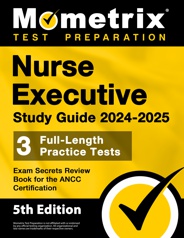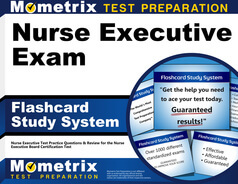The Nurse Executive nursing certification (NE-BC) is a credential awarded by the American Nurses Credentialing Center (ANCC) to registered nurses who pass the Nurse Executive board certification exam, demonstrating the necessary skills and competencies for executive-level positions.
Click “Start Test” above to take a free Nurse Executive practice test!
Exam Eligibility
To be eligible for the exam, you must meet the following requirements:
- Have an active RN license in the United States or a recognized equivalent in another country
- At minimum, a bachelor’s degree in nursing
- Within the last 3 years, completion of 30 hours of nursing administration continuing education (waived if the candidate has a master’s degree in nursing administration)
- Past experience in nursing administration, management, or teaching

Nurse Executive Exam Outline
The Nurse Executive exam contains 150 multiple-choice questions, 25 of which are unscored, and you will be given a 3-hour time limit. The unscored questions are used by ANCC to validate questions for future versions of the exam.
The exam is split into four content categories, and each category contains some number of knowledge questions and skill questions.
I. Human Resource Management (39 scored questions)
The questions in this category assess your knowledge of communication principles and federal employment laws. You will also be tested on the following skills:
- Employee performance management
- Team performance management
- Staffing fundamentals
- Employee engagement strategies
II. Quality and Safety (26 scored questions)
The questions in this category assess your knowledge of change management frameworks and culture of safety. You will also be tested on the following skills:
- Research and evidence-based practice methods
- Continuous process improvement
III. Business Management (18 scored questions)
The questions in this category assess your knowledge of reimbursement methods. You will also be tested on the following skills:
- Leadership styles
- Financial management
IV. Health Care Delivery (42 scored questions)
The questions in this category assess your skills pertaining to evaluating care delivery, facilitating patient experiences, and evaluating and integrating technology. You will also be tested on your knowledge of the following:
- ANA Nursing Administration Scope and Standards of Practice
- ANA Code of Ethics
- Emergency preparedness
- Regulatory and compliance standards
Check Out Mometrix's Nurse Executive Study Guide
Get practice questions, video tutorials, and detailed study lessons
Get Your Study Guide
Registration
To register for the exam, you must submit an application via the ANCC website. Your application should include all of the necessary proof-of-eligibility documentation and the examination fee, which is $295 for ANA members and $395 for non-members.
| Membership | Exam Fee |
|---|---|
| ANA member | $295 |
| Non-member | $395 |
Once your application is approved, you will receive a confirmation email containing your Authorization to Test (ATT) and information about scheduling your examination appointment.
Test Day
On the day of your exam, you should arrive at the testing center about 30 minutes before the exam is scheduled to begin. Once you arrive, you will be asked to provide two forms of identification, one of which must contain your photo and signature.
Personal items, such as cell phones, coats, wallets, food/drink, and reference materials, are not allowed in the testing area, so you will be asked to leave them in a secured locker before the exam begins.
Once the check-in process is complete, you will be led to your testing station and given a short tutorial on the testing system before beginning your exam.
How the Exam is Scored
The scores for the Nurse Executive exam are calculated using a criterion-based scoring system. This means that a panel of ANCC subject-matter experts has evaluated the questions and determined a passing score. The passing score is set using the modified-Angoff method, which means that your score is based solely on your performance, without any input from the performance of other test-takers.
Your score is reported on a scale of 1 to 500, and you must get a score of at least 350 to pass the exam.
You will be able to see your preliminary scores as soon as you complete the exam, and your final score report will be made available via your ANCC account.
Check Out Mometrix's Nurse Executive Flashcards
Get complex subjects broken down into easily understandable concepts
Get Your Flashcards
Nurse Executive Online Prep Course
If you want to be fully prepared, Mometrix offers an online Nurse Executive prep course designed to give you everything you need to succeed!
Here’s what you’ll find in the Nurse Executive course:
- 50+ Review Lessons Covering Every Topic
- 1,200 Nurse Executive Practice Questions
- 300+ Digital Flashcards
- Money-back Guarantee
- Mobile Access
Everyone learns differently, so we’ve tailored the Nurse Executive online prep course to ensure every learner has what they need to prepare for the Nurse Executive exam.
Click below to check it out!
FAQs
Q
How many questions are on the ANCC Nurse Executive exam?
A
There are 150 multiple-choice questions on the exam.
Q
How long is the ANCC Nurse Executive exam?
A
The time limit for the exam is 3 hours.
Q
What is the passing score for the ANCC Nurse Executive exam?
A
To pass the exam, you must obtain a minimum scaled score of 350.
Q
How much does the ANCC Nurse Executive exam cost?
A
The examination fee is $295 for ANA members ($395 for non-members).
Affiliate disclosure: As an Amazon Associate, we may earn commissions from qualifying purchases from Amazon.com.


